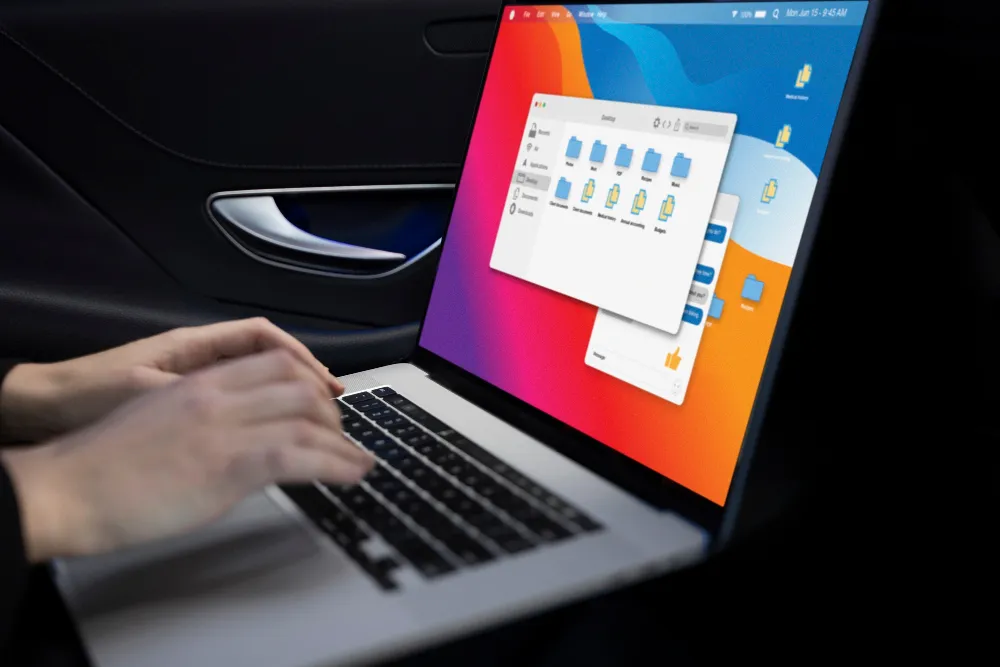Are you finding it difficult to pick the right internet connection for your business? Well, you’re not alone! With so many options available in Australia, from NBN to wireless broadband, it can be overwhelming to choose the right one.
The National Broadband Network is a fast and reliable Internet service that uses fibre-optic cable, fixed wireless, and satellite infrastructure, whereas a wireless broadband network is a type of telecommunication technology that provides the Internet using the wireless local network (WLAN) and wireless wide area network (WWAN).
But the question is, what are the differences between NBN and wireless broadband? Stay with us until the end as we walk you through the details of NBN and wireless broadband to help you make a suitable choice for your business.
Differences between wireless broadband and NBN
| Factor | NBN | Wireless Broadband |
| Speed | The average speed ranges from 12Mbps to 1Gbps, depending on the subscription. | Average speed for 4G ranges from 12Mbps to 100Mbps, for 5G ranges from 100Mbps to 250Mbps. |
| Cost | Plans are expensive for the high speed. | Plans are cheaper as compared to NBN. |
| Installation | Complex installation process with the requirement of technician. | Simple plug-and-play setup |
| Infrastructure | Fixed-line connection with fibre optic cables. | Relies on mobile networks like 4G and 5G. |
| Portability | Not portable. | Portable across various locations. |
| Maintenance | Technician visits for issue resolution. | Quicker maintenance and troubleshooting through the modem interface or service provider’s app. |
| Availability | Available only in urban and limited selected remote areas | Widely available in areas with mobile network coverage |
| Stability | Stable and consistent connection. | Comparatively less consistent. |
The Basics of Wireless Broadband and NBN
With technological improvement, the Australian government intends to update the outdated dial-up internet connection by 2025, promoting and implementing broadband services like wireless broadband and NBN.
The wireless network connection provides a quick internet connection for places where the cable network system is not available. NBN is a fixed-line internet service designed to address limitations and offer a broader range of connection options, including fibre optic.
Both have their own importance and uses. Let us dive deeper into the NBN and wireless broadband.
NBN
NBN is a government-funded broadband network operator in Australia. It provides an internet through a network of fibre optic cables that use light pulses. There are various options for fibre cable networks, such as Fibre To The Building (FTTB), Fibre To The Curb (FTTC), and Fibre To The Node (FTTN).
The speed ranges from 12Mbps to 1000Mbps, depending on the tier. Any business requires internet access of at least 25Mbps. The standard NBN offers a speed of 50Mbps and above, which is suitable for smooth business operations.
To get an NBN connection, consumers must check availability in their region, choose a plan, and schedule an installation date.
Are you experiencing slow internet? Explore the best NBN plans of NSWITs for your business and upgrade to the fastest internet service in Australia.
Wireless Broadband
Wireless broadband is a type of broadband internet that uses radio waves or microwaves to transmit data. Telecommunication companies or Internet Service Providers (ISPs) provide these services through mobile networks such as 3G, 4G, or 5G.
The average speed of wireless broadband plans can vary significantly depending on the service provider, location, and specific plan. While some plans may offer speeds in the range of 25 to 30Mbps, others may provide much higher or lower speeds.
There are two types of wireless broadband connection:
Home wireless broadband
Home wireless broadband provides internet access to devices within a home using a wireless router, utilising cellular networks or fixed wireless technology. Users connect multiple devices wirelessly to the internet via a modem or router provided by their service provider.
To set up this wireless home internet connection, you only need a modem. Connect the modem to the power adapter, then connect your devices to the wireless network and adjust the network settings for optimal performance.
Mobile broadband
Mobile broadband offers internet access through cellular networks, enabling connectivity on mobile devices like smartphones, tablets, and laptops. It allows users to access online services and browse the web from anywhere with network coverage, typically provided by mobile network operators.
For mobile broadband, insert the sim card provided by the broadband provider, turn on the device, allow it to connect to the mobile network, and then connect to the WiFi using the SSID and password.
Is NBN faster than wireless broadband?
Yes, NBN is much faster than wireless broadband due to the fast speed tier and the infrastructure that provides fixed-line connections to NBN. The NBN’s basic speed ranges from 12Mbps to 1Gbps, with unlimited data and higher download speeds. Its developed infrastructure also provides a stable internet connection despite weather and environmental hazards.
On the contrary, wireless broadband is slower due to the strength of the mobile network and the data-capped plan. Environmental obstacles, weather hazards, and interference from electronic devices can affect the strength of the mobile network, resulting in slow internet.
The average speed in a 4G network is 12Mbps to 100Mbps, whereas for a 5G network, it is 25Mbps to 250Mbps with limited data and slow download speeds. These plans are data-capped, which means the user can use a limited amount of data for a certain period. Once the user reaches the limited data, the internet speed becomes slow.
Yet, the best part about these data-capped plans is that they are affordable ways to get internet service.
Is wireless broadband cheaper than NBN?
Yes, wireless broadband is cheaper than NBN. First, wireless broadband providers offer affordable data-capped plans suitable for daily internet surfing. Second, the installation process for home wireless broadband is simple and does not require a technician.
Compared to wireless broadband, NBN is a bit expensive because of its complex setup, which requires a professional technician. Plus, NBN offers the fastest speed tiers, which are slightly more expensive than wireless broadband.
Pros and cons of NBN
NBN is a reliable and stable internet connection. Its high-speed access ensures smooth browsing, streaming, and downloading speeds for users. It is widespread in urban and regional areas of Australia.
However, its physical infrastructure may not be available in rural areas. Most of the time, the installation is delayed due to infrastructure expansion. Let us take a quick peek at the NBN’s advantages and disadvantages.
Pros
- Fastest internet plans compared to traditional ADSL.
- Stable and consistent connection.
- Easily scalable for multiple users and devices.
- Physical infrastructure adaptable to future technological advancements.
Cons
- Installation delays due to infrastructure expansion.
- Expensive plans for higher speeds.
- Limited access to NBN technologies like FTTN and FTTP in some areas.
- Compatibility issues with older devices requiring upgrades.
Pros and cons of wireless broadband
Wireless broadband offers quick and easy access to the Internet. It is widely available even in remote areas, and its setup is easy and convenient for users.
On the contrary, it offers slower speed due to data-capped plans and the fluctuating strength of mobile networks. It is also less secure and prone to getting hacked. Let us have a quick peek at some of its advantages and disadvantages.
Pros
- Flexible and convenient internet access.
- Quick installation.
- Widely available from rural to remote areas.
- Affordable data-capped plans.
Cons
- Speed is slower.
- Not dependable due to weather conditions or interference from electronic devices.
- Less secure due to the chance of getting hacked.
- Low coverage in places with weak mobile signal.
Which one is the most reliable?
Small and large businesses with heavy internet usage require a reliable, speedy, wide-area internet connection. NBN’s fixed-line connection makes it one of the most reliable options for such businesses. Its physical infrastructure is well developed and less susceptible to environmental factors and interference, providing a stable internet connection.
Additionally, home broadband relies on mobile networks. Environmental and geographical obstacles affect the strength of the network, resulting in instability of the internet connection. The 4G networks are well established, but the 5G networks are still in the development phase, which makes them accessible in remote areas of Australia.
The low strength of mobile networks and the inaccessibility of 5G networks in remote areas make them unreliable for business.
Which is the better option, wireless broadband or NBN?
The best internet option depends on your budget, locality, and internet usage. Users looking for fast and reliable internet find NBN better, and those looking for quick and convenient internet find wireless better. When considering all aspects of online connectivity, including security and accessing geo-restricted content, many users also seek out the fastest VPN Australia to complement their internet service.
Let us break down the conditions which help to decide which one to choose.
NBN is a better choice if:
- If you are a small or large business, then your internet requirement is high.
- Your area already has an NBN connection, and there are no performance issues.
- You want a reliable and fast internet plan.
But you can switch to wireless broadband if:
- You have to move frequently
- You need affordable internet data plans.
Conclusion
When comparing NBN and wireless broadband, the choice ultimately depends on various factors and the specific requirements of your business. NBN offers a reliable and stable fixed line connection, making it suitable for businesses requiring consistent high-speed internet access.
On the other hand, wireless broadband provides flexibility and mobility, which is ideal for users needing internet access on the go or in areas with limited NBN coverage.
If you are still having trouble deciding between NBN and wireless plans.
NSWITs is here to help you out. Contact us to explore all the suitable options. Our expert team is here to help. Why wait? Upgrade your internet connection today.










